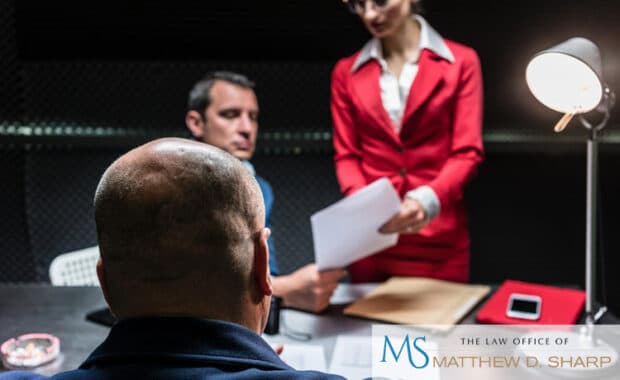
While many people enjoy watching crime dramas on TV, these shows are typically far from accurate and don’t provide real insight into what actually happens behind the scenes when police investigate and charge someone with a crime.
Anyone who’s ever experienced a crime or been charged with a criminal offense owes it to themselves to understand the criminal investigation process. The way that law enforcement handles crime investigations can play a huge role in how a criminal trial impacts your life. Read on to learn more about how criminal investigations are carried out in the real world.
An overview of the criminal investigation process
First of all, it’s important to understand that no two criminal investigations are exactly alike. While some investigations may vary widely in their specific details, most of these procedures will share some distinct similarities.
Most crime scene investigations will include these elements in roughly this order:
- Preliminary investigation: Notification of the offense and evidence gathering
- Primary investigation: Evidence analysis, follow-up and surveillance
- Arrests and charges
The preliminary investigation
The beginning of any preliminary investigation is the notification of an offense, which marks the start of the investigation. This often occurs after a person makes a call to 911 to request assistance or inform the police of a suspected crime, and police are dispatched to the scene.
If the alleged suspect is still present at the crime scene when the police arrive, they can arrest them right then and there, but an investigation will still need to take place.
Contain the crime scene
If there is no suspect on site to arrest and no one who needs immediate medical assistance, the police will begin working to contain the crime scene. This step is crucial for preserving evidence. The police will block off the scene, interview the person who reported the crime and check the premises for any potential suspects.
Gather evidence and conduct interviews
The next stage of a preliminary criminal investigation involves collecting evidence. Officers will look for items such as weapons, fingerprints, footprints, clothing fibers and any items that may contain the DNA of the perpetrator left at the scene, being sure to take photos to document their findings.
They’ll then conduct interviews with witnesses. Officers typically interview each person separately so they can compare the various accounts later if they differ.
Learn how and when DNA evidence can be used in criminal investigations.
The primary investigation
The primary investigation generally consists of the following:
- Analyzing the evidence gathered during the preliminary investigation. If blood or fingerprints were found at the scene, they’re run through databases to potentially match up to a suspect. Evidence must be properly handled and contained to avoid contamination.
- Reaching out to the public for help. If a description of the suspect has been provided by eyewitnesses, a sketch or profile may be given to local media outlets. Police may also ask the public to call a tip line.
- Conducting witness and suspect interviews. Police will follow up with witnesses to clarify information and interview any potential suspects in the case.
- Doing surveillance. If police have a potential suspect in mind, they may go undercover to gather evidence against them.
Types of surveillance in criminal investigations
Depending on the circumstances of the case, law enforcement officers might decide to conduct undercover surveillance as part of their primary investigation. There are 6 types of surveillance that often occur:
- Physical. Physical surveillance involves observing people or places while officers are around or near them.
- Electronic. Electronic surveillance is done using cameras, GPS trackers, microphones and other electronic devices to gather information.
- Computer. Computer surveillance is done by monitoring someone’s online activities, email, internet browsing history and more.
- Social media. Social media surveillance entails monitoring a person’s social media presence and activity.
- Financial. Financial surveillance is done by monitoring a person’s financial activities and transactions when financial crimes are suspected.
- Biometric. Biometric surveillance involves the use of technology to identify people through things like fingerprints, facial recognition or iris scans.
Charges and arrests
Once the crime scene evidence and tips have been analyzed, follow-up interviews have been conducted and surveillance has been completed, the police may have a better idea of a potential suspect.
If the evidence points to the potential guilt of a person of interest and they have enough evidence to charge them, the police would obtain a warrant from a judge and arrest their suspect for further questioning. At that point, they would press charges, book the suspect into jail and schedule an appearance in court.
What must be established before an arrest can be made?
Law enforcement cannot just arrest someone; instead, they need to have probable cause to believe a person has committed a crime. Once that is in place, they can obtain a warrant from a judge. Afterward, within 24 hours, a judge reviews the police’s evidence to determine whether there is, indeed, probable cause. This cannot merely be a police officer’s belief; it must be based on hard evidence that shows the person committed a crime.
Police must also take these precautions before making an arrest to ensure that they don’t infringe on a person’s Fourth Amendment rights. They cannot go into the person’s home or vehicle or go through their property to conduct a search without their consent or a warrant.
Texas Search and Seizure Laws: What the Police Can and
Can’t Do
Understand your rights during a search and seizure in Texas.
What are my rights during a police investigation?
When being questioned by the police, you should be aware of the following rights to ensure your protection:
- Right to remain silent. You have the right to remain silent and not incriminate yourself. You’re not obligated to answer any questions posed by the police. You can exercise this right by calmly stating that you choose to remain silent and would like to speak to an attorney.
- Right to an attorney. You have the right to have an attorney present during police questioning. If you cannot afford an attorney, they must provide one for you. You can request an attorney at any point during the questioning process.
- Right to know the reason for questioning. You have the right to know why the police are questioning you. You can ask the police officers for clarification regarding the nature of the investigation or the specific allegations against you.
- Right to refuse searches. In most cases, you have the right to refuse searches of your person, vehicle or property without a warrant. If the police ask for your consent to search, you can assert your right to refuse unless they have a valid search warrant or probable cause.
- Right to fair treatment. You have the right to be treated fairly and respectfully by the police. They should not engage in any form of physical or verbal abuse, coercion or intimidation during the questioning process.
Additionally, if you’re not under arrest, you generally have the right to leave. You can politely ask the police if you are free to go. If they confirm that you’re not being detained, you can calmly and respectfully end the encounter and leave the location. However, it’s crucial to exercise caution and avoid any sudden or suspicious movements that may give the impression of evading the police, as this could potentially escalate the situation.
It’s also important to remember that asserting your rights should be done respectfully and calmly. Avoid any confrontation or resistance, as it could escalate the situation. If you feel your rights are being violated, document the incident and seek legal representation as soon as possible.
How can a criminal defense attorney help during the pre-arrest investigation?
A criminal defense attorney can provide valuable assistance during the pre-arrest investigation stage of a criminal trial by doing the following:
- Provide legal guidance. A defense attorney can provide you with a clear understanding of your rights and the legal implications of the investigation. They will guide you on how to navigate the process, ensuring that you don’t inadvertently incriminate yourself or make statements that may harm your case.
- Protect your rights. An attorney will ensure that your constitutional rights are upheld throughout the investigation. They will monitor the actions of law enforcement to prevent any violations of your rights, such as unlawful searches, coercive tactics or improper questioning.
- Investigate your case. Attorneys have the resources and network to conduct their own investigations. They can gather evidence, interview witnesses and uncover information that may be crucial to your defense. By conducting an independent investigation, they may uncover facts that can challenge the prosecution’s case or provide evidence in your favor.
- Negotiate with prosecutors. In some cases, an attorney may be able to negotiate with prosecutors during the pre-arrest investigation stage. They can advocate for reduced charges or alternative resolutions that could minimize potential penalties or even prevent charges from being filed altogether. Skilled negotiation can lead to favorable outcomes, such as diversion programs or probation.
- Prepare for potential arrest. If it becomes apparent that an arrest is imminent, a defense attorney can help you prepare for the process. They can advise you on what to expect, assist with arranging bail if necessary, and guide you through the subsequent legal proceedings.
It’s essential to involve a criminal defense attorney as early as possible during the pre-arrest investigation stage. Their expertise and support can make a significant difference in protecting your rights, building a strong defense and achieving the best possible outcome in your case.
Get help from an experienced Houston criminal defense attorney
The criminal investigation process is the heart of the Texas justice system. It’s this process that can determine if you’re charged with a criminal offense. If you’re arrested and taken in for questioning, the best strategy is to contact an experienced criminal defense lawyer and refuse to answer any questions without your lawyer present. This will help you protect your rights and ensure that you have a chance for a strong defense in court.
Are you being subjected to a criminal investigation in Houston? You owe it to yourself to protect your legal rights. Attorney Matthew D. Sharp can help. Contact The Law Office of Matthew D. Sharp today for a free initial consultation.






